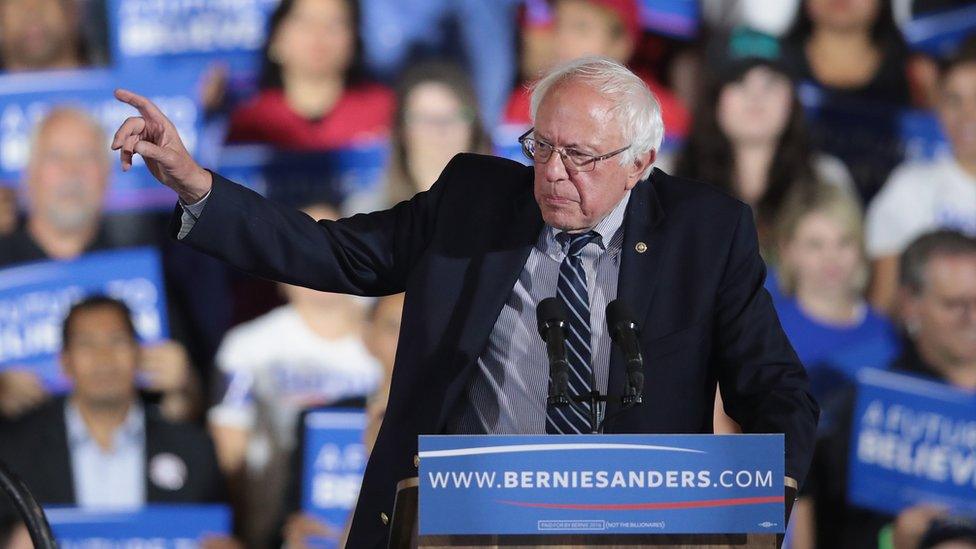Pressure builds on Bernie Sanders to drop out of race
- Published

Mr Sanders has vowed to keep fighting for the Democratic nomination
Pressure is building on Vermont Senator Bernie Sanders to give up his fight for the Democratic presidential nomination.
Hillary Clinton has been declared the presumptive Democratic nominee after winning four out of six primaries on Tuesday.
Mr Sanders has virtually no path to the nomination but has vowed to fight on. He meets President Obama on Thursday.
Democrats have urged Mr Sanders to join Mrs Clinton as she tries to defeat Donald Trump.
The billionaire businessman, seen as an outsider early in the campaign, is the Republicans' presumptive nominee.
The White House meeting on Thursday came at Mr Sanders' request. He will hold a rally in Washington the same day ahead of the District of Columbia's primary on 14 June.
He has won 22 state primaries and caucuses but failed to make a significant dent in Mrs Clinton's delegate lead, despite mounting what has been seen as an impressive campaign, influencing the Democratic debate and engaging with thousands of young voters.
How last major primary night unfolded
Live results from all six states
Why this election will make history
What an Obama endorsement will mean for Hillary
"The struggle continues. We are going to fight for every vote in Tuesday's primary in Washington DC, and then we will bring our political revolution to the Democratic convention in Philadelphia," his campaign said in a statement on Wednesday.
As the votes were being counted in California, Mr Sanders said: "I am pretty good at arithmetic, and I know that the fight in front of us is a very, very steep fight, but we will continue to fight for every vote and every delegate we can get."

Bernie Sanders: "We are going to fight hard"
Analysis - Anthony Zurcher, BBC News North America reporter
Bernie Sanders isn't giving up the fight for the nomination just yet - despite the near overwhelming odds stacked against him. But now, it seems, some of his most prominent supporters are edging away.
Senator Jeff Merkley of Oregon and Arizona Representative Raul Grijalva, who was a fixture alongside Mr Sanders in California, have essentially told the Vermont senator that it's time to rally behind Hillary Clinton.
But will he listen? In his late-night non-concession speech in Santa Monica, Mr Sanders said that he would continue to contest the nomination, despite it being "very, very steep fight". While the thousands in attendance went wild at the announcement, Mr Sanders may find his struggle an increasingly lonely one.
Vice-President Joe Biden, House Minority Leader Nancy Pelosi and, most importantly, President Barack Obama have all begun quietly, respectfully making motions to usher Mr Sanders from the stage.
After Mr Obama meets Mr Sanders on Thursday, the next step is likely a presidential endorsement of Mrs Clinton. Trailing in the popular vote and delegates, both the pledged and super variety, Mr Sanders may then have no choice but to acknowledge political reality.

Going into the California primary, Mr Sanders said he hoped to flip superdelegates, who do not have to say who they are supporting until the party convention in July, to come to his side.
But many political commentators have cast doubt on that aspiration.
Vice President Joe Biden has said it is up to Mr Sanders to decide when to drop out.
"Oh, let him make that decision," he said. "Give him time."
Senator Bill Nelson from Florida said Mr Sanders should "stand down" and Senator Bob Casey said Democrats must come together and unify.
Senator Jeanne Shaheen from New Hampshire said Mr Sanders should end his campaign soon.
The Sanders campaign is downsizing its staff by about half ahead of next week's DC primary.